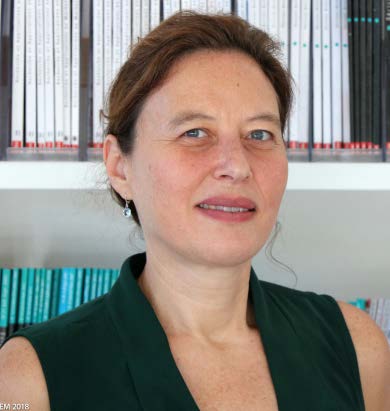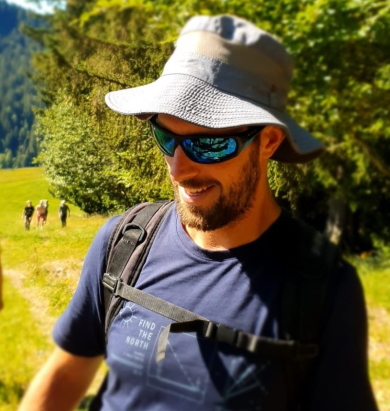Use the drop-down summary to access the articles in the folder.
Terms of republication
You can republish this article for free on your website, blog, etc.
Joint perspectives
Interview with Amina Béji-Bécheur, University Professor of Management at Université Gustave Eiffel and Anthony Marque, spokesman for the Narse de Nouvialle collective.
How did the OAC-La Narse project come about?
Anthony Marque : The research team did not get involved in defending the wetland. The work we did with them focused on promoting the region and local heritage, defining its economic potential and how to promote it to elected representatives, local residents and economic players. What was really interesting was the complementary nature of the approaches. The researchers’ approach was scientific and objective, with a whole process of investigation, and we provided them with knowledge of the area and the issues, which they ended up acquiring.
Amina Béji-Bécheur : What really interests us is getting inside the fabric of an organisation. It’s not about studying “objects” from the sidelines or outside the phenomenon under study, but rather interacting with the people involved. The idea behind the OAC project, and the Narse de Nouvialle project in particular, is that the research partners themselves become researchers. As for us, we became players in the collective. This collaborative project went beyond simple cooperation, where everyone stays in their own role, sticking to their own job.
What difficulties did you encounter?
Anthony Marque : Researchers take a scientific approach, whereas we’re less about thinking about method and more about action. Sometimes we felt that we weren’t progressing as quickly as we would have liked and that it wasn’t helping us as much as we needed. We had to get to know each other.
Amina Béji-Bécheur : At the outset, we didn’t necessarily speak the same language and we had to overcome this “otherness” through regular communication. As researchers, we have expertise in questioning and gathering information, whereas citizens spontaneously adopt a non-expert stance. The risk is questioning the other person without giving them the opportunity to question us in return, and finding ourselves in a position of giving advice. We had a few issues with this because we were asked to give recipes, which we didn’t want to do. It took time to find the right tools to work together.
The support provided by the researchers encouraged us and guided our efforts.
What did you get out of it?
Anthony Marque : Now that we know that the collaboration is coming to an end, we are realising what it has brought us, mainly in terms of methodology. We have been able to gather information and figures that will enable us to present a sustainable economic project and arguments in favour of preserving the wetland, by highlighting what local residents and stakeholders have told us. The support provided by the researchers really encouraged us and guided our efforts.
Amina Béji-Bécheur : Participatory research does not come naturally to a researcher and requires a great deal of thought. There is a lot of work being done on the subject, but until you have experienced it for yourself, it remains theoretical. Firstly, this project has enabled us to improve our approach to the “field”, which we tend to anonymise, even to protect, by referring to “citizens” or “stakeholders”, which puts a certain distance between them and us. It is always important to know the right distance to maintain in order to move away from a position of authority while remaining part of the research process. Then, together, we developed new knowledge about citizen-led organisations and their ability to produce economic projects that respect a common heritage, natural resources and a living environment, knowledge that we will be able to share with our students. Research enriches our teaching. It’s a very rich approach that I see as part of the ongoing training of research professors.
Find out more about the project leaders

Amina Béji-Bécheur
Amina holds a doctorate in Management from Université Paris Dauphine, and was an associate professor at Université Lille 2 before joining Université Gustave Eiffel as Professor of Management and Head of the Master’s course in Management of Social and Solidarity Enterprises. After studying the development of fair trade in France, in partnership with the association Artisans du Monde and Plateforme du Commerce Equitable (now Commerce Équitable France), she continued her research into Collective Interest Cooperative Companies and then Participative Interest Cooperative Companies. She is Deputy Director of the Institut de Recherches en Gestion (IRG - Management Research Institute), and is one of the coordinators of the Organisations Alternatives de la Citoyenneté Nord & Sud project and, since 2022, President of the French Marketing Association.

Anthony Marque
After completing a degree in Entrepreneurship and Management of Social and Solidarity Economy Administrations at Université Clermont Auvergne, Anthony Marque trained as a mountain guide. He was a Secours Populaire youth worker from 2006, coordinated the Puy de Dôme federation and was its director of integration projects from 2013 to 2016, during which time he was also the association’s national secretary. In January 2017, he embarked on a round-the-world cycling trip that took him from Clermont Ferrand to Cape Horn, via Spain, Morocco and Senegal, then from Panama to southern Chile. Back in France, he worked as a mountain guide and, in 2020, became involved in the Narse de Nouvialle collective, of which he is the spokesman.
![[Translate to English:] Licence creative commons BY-SA 4.0 [Translate to English:] Licence creative commons BY-SA 4.0](https://reflexscience.univ-gustave-eiffel.fr/fileadmin/ReflexScience/Accueil/Logos/CCbySA.png)